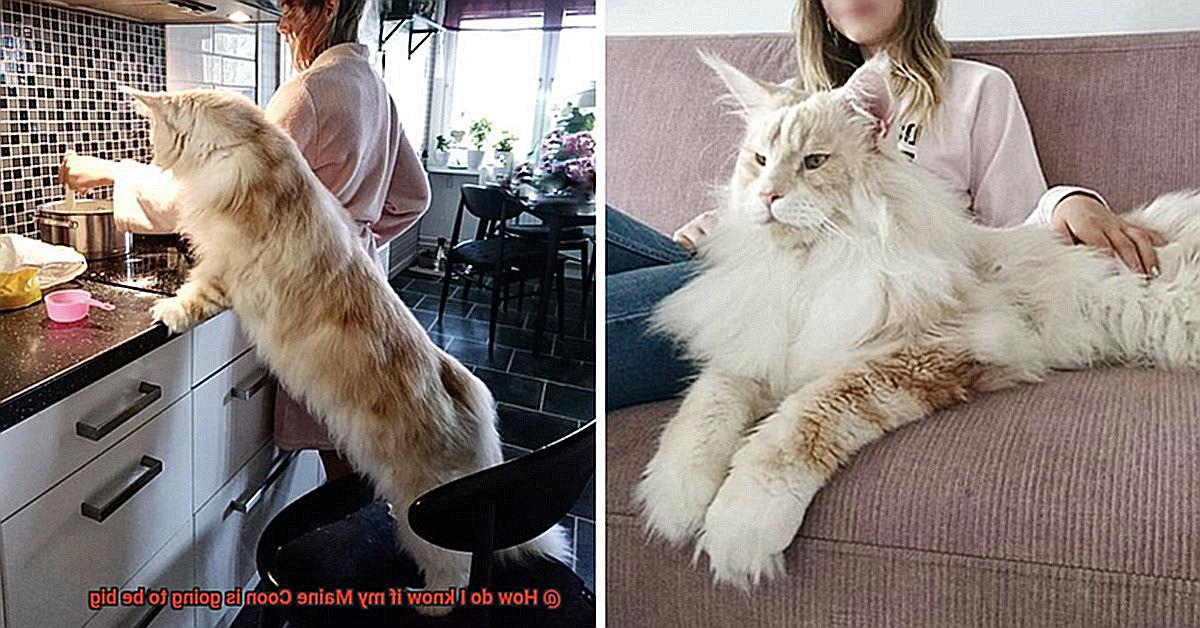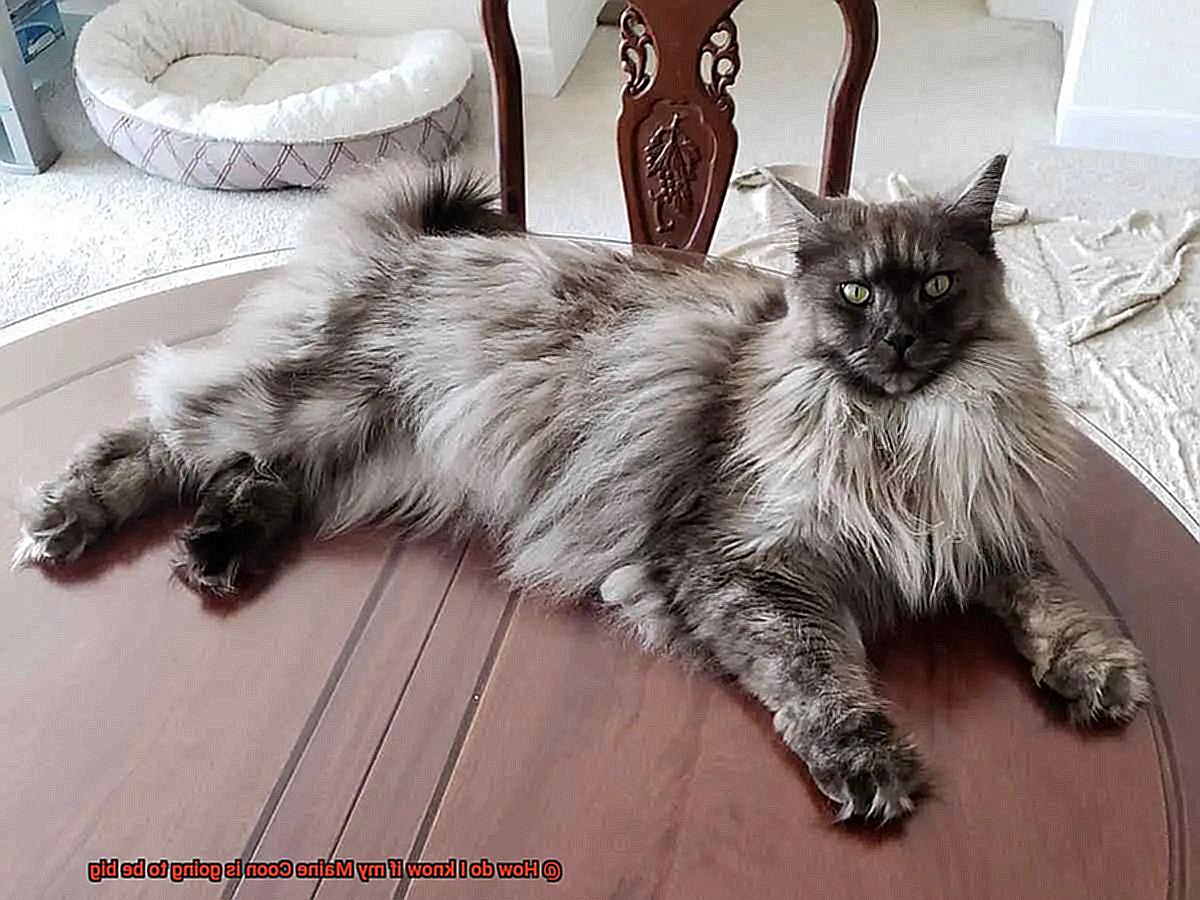Are you a cat lover who’s considering getting a Maine Coon? Or maybe you already have one and are curious about how big they’ll grow. With their stunning looks, gentle nature, and loving personality, it’s no wonder that Maine Coons are one of the most popular cat breeds in the world.
But what makes these cats stand out from the rest is their size. Maine Coons are known for being large cats, but how can you tell if your furry friend will be on the bigger side? In this blog post, we’ll explore all the factors that influence a Maine Coon’s growth and help you determine their adult size.
From genetics to nutrition, we’ll cover everything you need to know about predicting your Maine Coon’s final size. And if you’re already a proud owner, we’ve got some tips to help you monitor your cat’s growth along the way.
So why not join us as we dive into the fascinating world of Maine Coons? Whether you’re a first-time owner or a seasoned pro, this blog post has something for everyone who loves these affectionate, playful felines with unique features. Get ready to discover all there is to know about predicting your Maine Coon’s size.

What is a Maine Coon?
Look no further than the Maine Coon cat breed. These gentle giants are beloved for their large size, fluffy fur, and affectionate personalities.
Maine Coons are one of the oldest natural breeds in North America, originating in the state of Maine. They were originally working cats, helping to control rodent populations on farms and ships. However, over time, their friendly and loving nature made them popular as pets.
Standing out from other cat breeds with their muscular bodies, broad chests, and long bushy tails, Maine Coons also have large tufted ears and a ruff of fur around their necks. Their fur comes in a variety of colors and patterns, including tabby, solid, tortoiseshell, and calico.
But what really sets Maine Coons apart is their size. These cats are one of the largest domestic cat breeds, with adult males weighing up to 20 pounds or more and females weighing between 8-12 pounds. However, it can take them up to five years to reach their full size.
So how can you determine if your Maine Coon will be a big cat? Look at their parents’ size and gender for clues. If both parents are large with a robust build, there is a high likelihood that the kitten will grow up to be a big cat. And remember – male Maine Coons are generally larger than females.
Despite their size, Maine Coons are gentle and affectionate. They have earned the nickname “gentle giants” because of their loving personalities. They make great pets for families or individuals alike.
Factors That Influence a Maine Coon’s Size
Several factors can influence the size of a Maine Coon, and it’s essential to understand these factors if you want your feline friend to reach their full potential.
Genetics is the primary factor that determines a Maine Coon’s size. These cats are bred for their size, and breeders selectively breed cats with larger-than-average body frames to produce bigger offspring. However, genetics is not the only factor that comes into play.
Gender also plays a crucial role in determining a Maine Coon’s size. Males are generally larger than females and can weigh up to 18 pounds or more. Females, on the other hand, usually weigh between 8-12 pounds. Though there can be exceptions, with some female Maine Coons growing much larger than usual.
Diet and exercise are essential factors when it comes to a Maine Coon’s size. A healthy diet that is high in protein and low in carbohydrates helps ensure that your cat gets the nutrients it needs to grow to its full potential. Regular exercise is also crucial to keep your cat’s muscles toned and healthy.
To help your Maine Coon reach its full potential, it’s vital to provide them with a healthy diet and plenty of exercise from the start. Opting for high-quality cat food that is rich in protein and low in carbohydrates can make all the difference. Plus, ensuring that your feline friend gets enough physical activity will contribute to their overall well-being.
Parental Size
Maine Coon cats are renowned for their large frames, with males typically being larger than females. Their weight can range anywhere from 9 to 18 pounds. Genetics is a significant factor in determining your Maine Coon’s size, and parental size can give you a good idea of what to expect.
If your Maine Coon’s parents were particularly large, it’s likely that your kitty will follow suit. Conversely, if the parents were smaller, your cat may not grow as big as other Maine Coons. However, keep in mind that this is not an exact science, and there is no guarantee that your cat will grow to be as large as their parents.
While genetics play a crucial role in determining your cat’s size, proper nutrition and exercise are also essential factors. Providing your Maine Coon with a healthy diet and regular exercise can help them reach their full potential.
Gender of the Kitten
One factor to consider is the gender of your furry friend, as male Maine Coons tend to be larger than females. This is because male cats have higher levels of testosterone, which promotes muscle and bone growth. On average, male Maine Coons can weigh anywhere from 13-18 pounds, while females typically range between 8-12 pounds.
But don’t forget about genetics. If both parents are large, their offspring will most likely be on the larger side. However, if one or both parents are smaller in size, their kittens may not reach the same size as a typical Maine Coon.
It’s important to keep in mind that while gender can provide an estimate of your cat’s potential size, it’s not a surefire guarantee. Every cat is unique and may not fit into the typical size range for their gender. So even if you have a female kitten, don’t be surprised if she ends up being bigger than expected.
Age of the Kitten
Luckily, the age of your kitten can give you some helpful clues. Here’s what you need to know:
Maine Coons are known for their slow growth rate, taking up to four years to reach their full size. However, during their first few months of life, you can still observe growth patterns that give you an idea of their future stature.
During the first few weeks, Maine Coon kittens grow rapidly and gain weight quickly. By six to eight weeks old, they should be confidently running around. This is the perfect time to start observing their overall build and size.
Maine Coons are known for their large and muscular bodies, with a rectangular shape when viewed from above. If your kitten appears long and lean with a smaller bone structure, they may not grow as big as other Maine Coons.
It’s important to note that genetics also play a significant role in determining size. If both parents were large and muscular, chances are your kitten will follow suit. However, if one or both parents were smaller in stature, your kitten may not grow as big.
IydtaZSfCNg” >
Other Factors That May Affect Growth Rate
While genetics is a significant factor in determining their size, there are other crucial factors that can impact their growth rate. Let’s take a closer look at these factors.
Firstly, genetics play a significant role in determining the size of your Maine Coon. If your kitten comes from a line of large cats, it’s likely that they’ll also grow to be big. However, it’s essential to know that genetics is not the only factor that affects growth rate.

Diet is another critical factor that can impact the growth rate of your Maine Coon. Providing your cat with a diet that is high in protein and essential nutrients can help them reach their full potential. Conversely, a diet that lacks essential nutrients can stunt growth and lead to health problems.
Regular exercise also plays an essential role in the growth and development of Maine Coons. These cats require exercise to build strong muscles and bones that are necessary for supporting their large size. Lack of exercise can lead to obesity and other health problems.
Finally, health issues can also affect the growth rate of Maine Coons. If your cat is experiencing health problems, they may not be able to grow as quickly or as large as they would otherwise. Regular check-ups with a veterinarian are vital to ensure that your cat is healthy and developing correctly.
Also Read: How To Keep a Maine Coon Growth Chart
Conclusion
As we wrap up, it’s clear that Maine Coons are a remarkable breed of feline known for their gentle demeanor, loving personalities, and impressive size. While genetics undoubtedly play a significant role in determining their final stature, other factors such as diet, exercise, and overall health can also impact their growth rate.
To get an idea of what to expect from your cat’s growth rate, take a look at the size and build of its parents. Typically, male Maine Coons tend to be larger due to higher testosterone levels promoting muscle and bone growth. Proper nutrition with high-quality cat food rich in protein and low in carbohydrates is also crucial for healthy development.
Regular exercise is equally essential for building strong muscles and bones necessary for supporting their large size. Remember that Maine Coons have a slow growth rate taking up to four years to reach full size. During the first few weeks of life, observing their overall build and size can provide clues about their future stature.
It’s important to note that genetics isn’t an exact science; every cat is unique and may not fit into the typical size range for its gender. By understanding these factors, you’ll be better equipped to determine if your Maine Coon will be on the bigger side while providing them with proper care for healthy growth and development.

